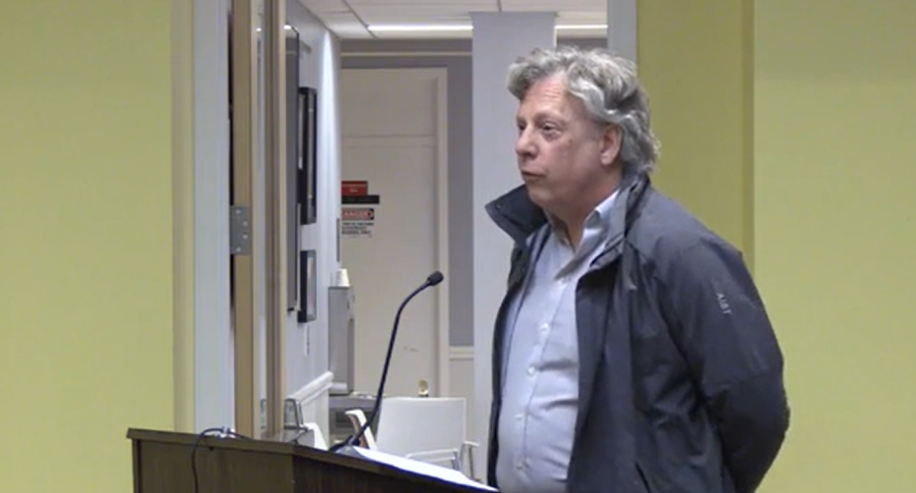At the start of its meeting Wednesday, the Andover Select Board went into an executive session to review and approve releasing minutes from similar closed-door sessions it held in 2015 and 2017.
It was long overdue, resident Steve Walther told the board when it returned to open session.
“The Town has not been complying with the Massachusetts Public Records Law, and has not been complying for some number of years,” Walther (photo, above) said in the public comment period of the meeting. “This compliance issue isn’t an oversight…this is sustained noncompliance over many years. To me, that is a form of gross negligence.”
Last month, the Town released 60 pages of executive session minutes dating back to 2018 in response to Walther’s request under the Massachusetts public records law. On Thursday, the Town released 69 pages additional executive session meeting minutes from 2015-17 after a second records request by Walther on March 30.
Town Clerk Austin Simko said the select board holds executive sessions when minutes are requested to and votes on whether minutes should be released.
“We could have provided, for example, minutes from 2015 redacted at the level of redaction in 2015. But we thought it’s more appropriate to provide a level of redaction for 2023,” he said. “I believe it’s more complicated than that, and I believe we are doing everything we can to provide the most information available and is appropriate for release at any given time.”
The Town released minutes from 37 of 52 executive sessions Walther requested last month, citing exemptions in the public records law for not releasing minutes from 15 executive sessions. Chair Alex Vispoli is the only current select board member who was in office for all of 2015-17. Laura Gregory, who was first elected to the board in 2017, was there for some of the meetings as well.
What The Law Says
Simko said rules about releasing meeting minutes fall under both the open meeting and public records law.
“This is complicated, [it’s] not simple in any way,” Simko said. “To say executive session minutes should be available or unavailable or redacted is a level of analysis that happens at the open meeting law level. But then a secondary analysis that has to happen — and this changes at the point in time of the minutes requested — under the public records law.”
The complexity stems from the rules falling under both laws.
“In some instances, there may be overlap in the posting requirements of the Open Meeting Law and other statutes,” the Massachusetts Attorney General’s Open Government Division’s FAQ on the open meeting law. “In most cases, the information required by the controlling statute will satisfy the Open Meeting Law…requirements.”
The Massachusetts Open Meeting Law requires public bodies to “create and approve minutes of all meetings, including executive sessions” in a “timely manner.” The law defines “timely manner” to generally be within 30 days or the next three meetings of the board. The boards can, however, delay approval if they can “show good cause for further delay.”
“The Attorney General encourages public bodies to approve minutes at the next meeting whenever possible,” according to the Open Government Division.
More Info: Secretary of State’s Guide to the Massachusetts Public Records Law
The open meeting law allows boards to choose the method for approving minutes. Page 12 of the Andover Select Board’s policy guidelines says:
Accurate records must be maintained for all Executive Sessions. At a minimum, the records must set forth the date, time, place, members present or absent, and action taken. According to the law, Executive Session records may remain secret only ‘so long as publication may defeat the lawful purposes of the Executive Session, but no longer.’
Photo: Screen shot/Andover TV

